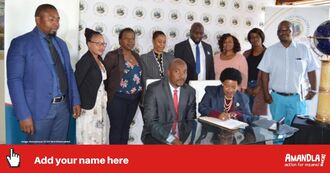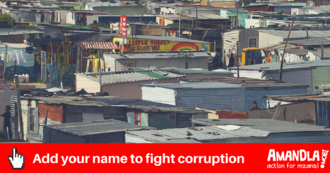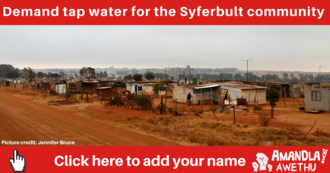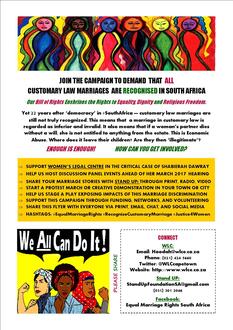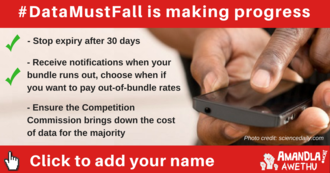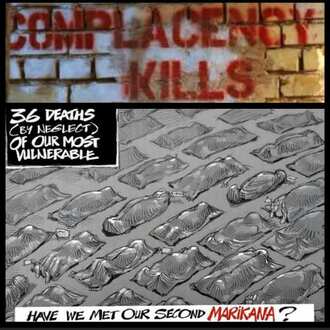- Featured
- Clean air
- Climate justice
- Consumer Rights
- Corporate Accountability
- Data access
- Early Childhood Development
- Economic fairness
- Education
- Electoral fairness
- Environmental justice
- Food justice
- Gender based violence
- Grants/social assistance
- Health
- Housing and infrastructure
- Industry interference
- Land Justice
- LGBTQIA+ rights
- Media/ information access
- Public transport
- Racism
- Reparations
- Safety
- Sanitation
- Service Delivery
- Sexual and Reproductive Rights
- Social justice
- Unemployment
- Womxn's rights/ gender equality
- Workers' rights
- More
-
Fight corruption, demand transparent service delivery in Govan Mbeki MunicipalityWe can improve service delivery and fight corruption in our Municipality by ensuring all Service Delivery Agreements (SDAs) are public and easily accessible to all. Some politicians, officials and businesses are scared about transparency, but if they aren't doing anything wrong, what have they got to hide. * This campaign by amandla.mobi is supported by Heinrich Böll Stiftung.100 of 200 SignaturesCreated by Thulile Motha
-
Fight corruption, demand transparent service delivery in Bojanala Platinum District MunicipalityWe can improve service delivery and fight corruption in our Municipality by ensuring all Service Delivery Agreements (SDAs) are public and easily accessible to all. Some politicians, officials and businesses are scared about transparency, but if they aren't doing anything wrong, what have they got to hide. * This campaign by amandla.mobi is supported by Heinrich Böll Stiftung.6 of 100 SignaturesCreated by Tshiamo Sehunoe
-
Fight corruption, demand transparent service delivery in Msukaligwa Local MunicipalityWe can improve service delivery and fight corruption in our Municipality by ensuring all Service Delivery Agreements (SDAs) are public and easily accessible to all. Some politicians, officials and businesses are scared about transparency, but if they aren't doing anything wrong, what have they got to hide.4 of 100 SignaturesCreated by Bonginkosi Lucky Duba
-
Fight corruption, demand transparent service delivery in uMgungundlovu District MunicipalityWe can improve service delivery and fight corruption in our Municipality by ensuring all Service Delivery Agreements (SDAs) are public and easily accessible to all. Some politicians, officials and businesses are scared about transparency, but if they aren't doing anything wrong, what have they got to hide.7 of 100 SignaturesCreated by Siyabonga Mbanjwa
-
Fight corruption, demand transparent service delivery in AbaQulusi MunicipalityWe can improve service delivery and fight corruption in our Municipality by ensuring all Service Delivery Agreements (SDAs) are public and easily accessible to all. Some politicians, officials and businesses are scared about transparency, but if they aren't doing anything wrong, what have they got to hide.2 of 100 SignaturesCreated by Phumlani Mangethe
-
Fight corruption, demand transparent service delivery in Emalahleni Local MunicipalityWe can improve service delivery and fight corruption in our Municipality by ensuring all Service Delivery Agreements (SDAs) are public and easily accessible to all. Some politicians, officials and businesses are scared about transparency, but if they aren't doing anything wrong, what have they got to hide.29 of 100 SignaturesCreated by Chris Van Rooyen
-
Fight corruption, demand transparent service delivery in Mogale City Local MunicipalityWe can improve service delivery and fight corruption in our Municipality by ensuring all Service Delivery Agreements (SDAs) are public and easily accessible to all. Some politicians, officials and businesses are scared about transparency, but if they aren't doing anything wrong, what have they got to hide.5 of 100 SignaturesCreated by Alan Exton
-
STOP TAXING OUR PERIODHave you ever wondered about the impact of a woman's period on society? For many women around the globe and in particular our home country South Africa, this is a daily challenge, especially when trying to have access to affordable sanitary wear. At present the majority of women around the world are currently on a menstrual period and there are millions of women who do not have access to this basic necessity, especially our school-going young women, who can ill-afford to miss school during their developing years. Those who can afford sanitary wear, are then subjected to paying tax on acquiring a basic necessity to feel clean and comfortable, during a period. With the escalating price of sanitary towels it would be most welcoming if our government can drop the tax on this very important commodity. In order to grow a self-sustainable country we need to ensure that we create a strong foundation and that is investing in our future generation. The women of our country serve the backbone of our economy and if we cannot ensure their well-being then the cycle of poverty is perpetuated. Please SIGN THE PETITION TO STOP TAXING OUR PERIOD91 of 100 SignaturesCreated by Cecilé-Ann Pearce

-
Water4SyferbultSyferbult is a very impoverished community of over a 1000 people living in shacks. About a hundred of the adults get seasonal work, from two to four months of the year; the rest make do on whatever grants they can access. Despite a contractor putting in taps and pipes that function, fgor years the community has received slightly erratic tanker water. In September, they received nothing for three full weeks. Since then they have received approximately four tankers (enough for drinking water for four days) and the water has run in the taps twice for about 45 minutes (without any warning or notification). The councillor for Ward 36 claims this is because they owe Eskom R6000; I've also been told the water can't be pumped because of: cable theft; problems with the diesel generator; a circuit breaker malfunctioning; and the township has not been formalised (if so, why was infrastucture contracted and put in place?) On 18 October, the thirsty, dusty and dirty community finally exploded and marched in protest. They were met with rubber bullets and tear gas - one person was injured, thankfully not seriously. And still the children, the sick, the elderly are thirsty - so thirsty that when we arrive with bakkie-loads of water, they run and jump on the back of the moving vehicle, unable to hold back, desperate for the precious fluid. This is unconstitutional. "The right of access to sufficient water is accorded to everyone in s 27(1)(b) of the Constitution, which states that everyone has the right to have access to sufficient water. Section 27(2) requires the State to take reasonable legislative and other measures, within its available resources, to achieve the progressive realisation of the right." Syferbult is not alone in this plight. I have heard of at least six other communities in Rustenburg area with the same problem. Yet phoning, emailing, attending meetings , buttonholing the councillor.... nothing works. Please spread this far and wide.194 of 200 SignaturesCreated by Mandi Smallhorne
-
Respect Customary Marriages In South AfricaMEDIA RELEASE: New date agreed by the parties in the recognition of Muslim marriages class action Today, Monday 20 March 2017, the before Human Rights Day, a new date was agreed by the parties concerned for the recognition of Muslim marriages class action to heard by the High Court. The 28th August has been agreed. A directions hearing was convened by the High Court this morning after the Judge President ordered the consolidation of a further matter pending before the High Court which similarly highlights the plight of Muslim women. There are several matters that are pending at a number of courts across the country. This is testament to the fact that Muslim women are struggling to assert their rights because their Muslim marriages and the consequences arising therefrom are not legally recognised. They have no option but to plead their cases with the courts and the judiciary. Given the importance of the matter three judges have now been appointed to hear the matter. Namely; Judges S Desai, G Salie-Hlophe and NP Boqwana. This morning saw women come to the steps of the High Court from all over Cape Town to show solidarity and support for this matter. The lived reality of these women is that legal protection has been denied to them some 16 years after the Constitution came into force. This results in widespread oppression and gender discrimination in areas such as divorce, the duties of support, parental rights and responsibilities and inheritance. Press Release On Other Case Outcomes: http://www.wlce.co.za/images/press%20releases/WLC_Customary%20Marriages%20Act_Limpop%20ruling_020816%20press%20release.pdf Article: Are nikah and sindoor equal to wedding rings and lobola?: http://www.standup.co.za/bambanani-social-justice/resources/63-wlc-customary-marriages-case.html Also Read: http://www.polity.org.za/article/official-customary-law-and-the-disruption-of-patriarchal-power-the-case-of-msinga-2013-09-2631 of 100 SignaturesCreated by Stand UP! Foundation

-
Sign the campaign #DataMustFallResearchers who took into account cost of living, have found that South Africa has the second most expensive data costs among BRICS countries [1]. Previously as reported by IOL, many have claimed that Mzansi’s data costs are the highest in the world: 1GB (gigabyte) of data costs R150 in Mzansi, compared to R11 in India, R22 in Nigeria and R23 in Namibia [2]. However, this comparison is not adjusted for cost of living, so in order to compare apples with apples. Indra de Lanerolle, an expert whose research concerns Internet access, use and development and the Internet's social, political and economic effects, in South Africa and the continent, agrees with the call for a 50% cut on data costs when he asserts, "On three major networks (which account for more than 95% of all mobile customers) 500MB – the amount of data they set as a minimum – of data costs between R85 and R105. So for the average South African 500MB per month is unaffordable. In fact mobile data prices would have to fall by about half to be affordable." [3] The digital divide excludes the majority of people in South Africa from accessing information and news, applying for jobs, accessing education resources online and keeping in touch with family and friends. High data costs perpetuate inequality. The internet must be democratised now! The nature of South Africa’s economy forces many to leave their loved ones to find work in urban areas, but lowering the cost of data will allow people to call, share pictures and videos with loved ones back home. Without access to data, most of us as the members of amandla. mobi would not even be able connect and fight for social justice, let alone know what is going on in our country given the SABC censoring news lately. [1] http://www.fin24.com/Tech/Multimedia/data-prices-how-sa-compares-to-the-rest-of-the-world-20160930 [2] http://www.iol.co.za/news/politics/datamustfall-cut-costs-or-else-icasa-warns-2072293 [3] https://theconversation.com/internet-freedom-why-access-is-becoming-a-human-right-5912557,874 of 75,000 SignaturesCreated by amandla mobi member

-
Transparency and Timeous Resolutions with reference to the Life Esidimeni disasterMental health patients are one of our vulnerable populations, and needs care and protection. Care for those suffering from mental illnesses should be conducted in a dignified manner. The 2013-2020 South African Mental Health Policy Framework and Strategic highlights the fact that "the human rights of people with mental illness should be promoted and protected". The relocation of the Life Esidimeni patients are in stark contrast to the Mental Health Policy and the South African Disability Act. A number of reports have indicated that the necessary care and human rights treatment of these patients have not been met. "Just because You can't Speak; doesn't Mean You don't have Anything to Say" MENTAL HEALTH CARE ACT 17 OF 2002 ACT To provide for the care, treatment and rehabilitation of persons who are mentally ill; to set out different procedures to be followed in the admission of such persons; to establish Review Boards in respect of every health establishment; to determine their powers and functions; to provide for the care and administration of the property of mentally ill persons; to repeal certain laws; and to provide for matters connected therewith. PREAMBLE RECOGNISING that health is a state of physical, mental and social well-being and that mental health services should be provided as part of primary, secondary and tertiary health services; RECOGNISING that the Constitution of the Republic of South Africa, 1996 (Act No. 108 of 1996), prohibits against unfair discrimination of people with mental or other disabilities; RECOGNISING that the person and property of a person with mental disorders or mental disabilities, may at times require protection and that members of the public and their properties may similarly require protection from people with mental disorders or mental disabilities; and RECOGNISING further that there is a need to promote the provision of mental health care services in a manner which promotes the maximum mental well-being of users of mental health care services and communities in which they reside [http://www.hpcsa.co.za/Uploads/editor/UserFiles/downloads/legislations/acts/mental_health_care_act_17_of_2002.pdf] WHITE PAPER ON THE RIGHTS OF PERSONS WITH DISABILITIES Approved by Cabinet on 9 December 2015 The White Paper is a call to action for government, civil society and the private sector to work together to ensure the socio-economic inclusion of persons with disabilities. We therefore seek to create a caring and inclusive society that protects and develops the human potential of its children, a society for all where persons with disabilities enjoy the same rights as their fellow citizens, and where all citizens and institutions share equal responsibility for building such a society. “Everyone is equal before the law and has the right to equal protection and benefit of the law. Equality includes the full and equal enjoyment of all rights and freedoms. To promote the achievement of equality, legislative and other measures designed to protect or advance persons or categories of persons, disadvantaged by unfair discrimination may be taken.” The Constitution of the Republic of South Africa, 1996 [http://www.gov.za/sites/www.gov.za/files/39792_gon230.pdf]190 of 200 SignaturesCreated by Janine Bezuidenhoudt
.png)
